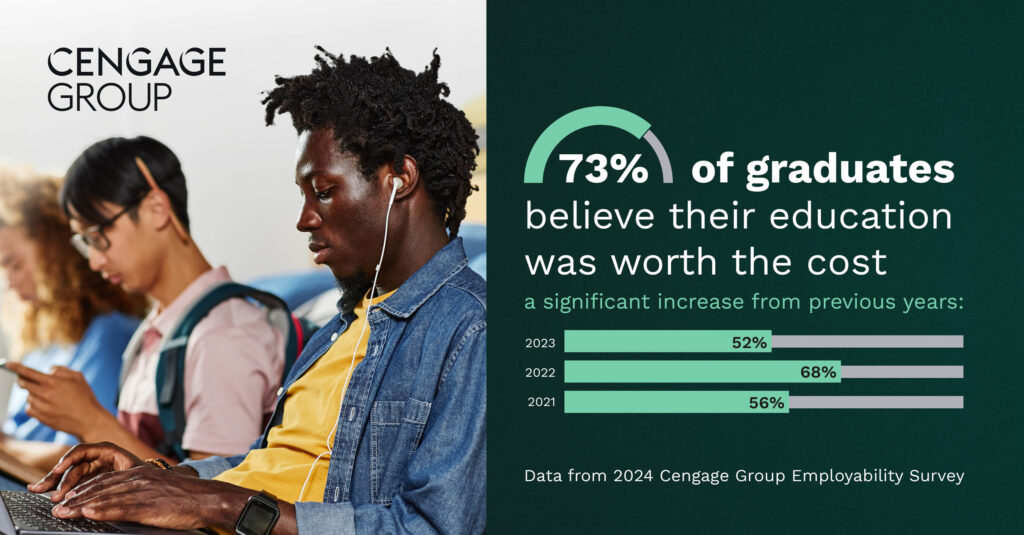Despite a positive labor market and high demand for skilled talent, employers continue to struggle with finding and retaining workers to meet their evolving business needs. A new report released today from Cengage Group, a global edtech company, reveals significant shifts in graduate perceptions, the growing impact of AI on the workforce and how post-secondary education is adapting to meet these challenges.
The 2024 Cengage Group Employability Report, based on surveys of 1,000 U.S. employers and 974 recent graduates (individuals who received a 2- or 4-year degree and/or a skills certification within the last year), offers key insights into how educational institutions are evolving to close talent gaps and prepare students for an AI-driven future, with a growing emphasis on practical, job-ready skills alongside traditional academic credentials.
This curricula shift toward employability has improved graduates’ perceptions of education value with a substantial three in four (73%) graduates believing their education was worth the cost, a significant increase from 52% in 2023, 68% in 2022 and 56% in 2021. Additionally, two-thirds (68%) feel their education has positioned them for success in the current job market. The recognition of the need for higher education has also increased, with 51% of graduates stating that a college degree or certification was essential to their job performance, up from 42% in 2023. Perhaps most importantly, there has been a marked improvement in the focus on employable skills, with nearly 3 in 5 graduates (57%) believing their program equipped them with the skills needed for their first professional job, a considerable rise from 41% in 2023.
“Our 2024 Employability Report reveals post-secondary education is experiencing a pivotal moment,” said Michael Hansen, CEO of Cengage Group. “The increased satisfaction among graduates and their improved perception of education’s value are encouraging signs that educators are listening and responding to the needs of both students and employers. As we continue to bridge the gap between education and employment, we’re not just preparing students for jobs – we are empowering them to build successful, adaptable careers in an ever-changing market.”
While the perceived value of education has improved over the last year, the report also exposes opportunities to continue driving new value by enhancing GenAI literacy. In fact, graduates expect it, with 3 in 4 (70%) believing basic GenAI training should be integrated into courses. As GenAI becomes more common in the workplace, there are critical disconnects between the widespread adoption of GenAI in the workplace and the preparedness – or lack thereof – of graduates to use these tools effectively. Key findings include:
- Graduates feel unprepared to work alongside GenAI: Currently, more than half (55%) of graduates said their programs did not prepare them to use GenAI tools. Gen Zers are the most likely to feel this way (61%) compared to Millennials (48%), Gen Xers (60%) and Baby Boomers (50%). Nearly 3 in 4 (69%) graduates say they need more training on working with new technologies in their current roles.
- AI is creating career doubt: Over half (51%) of graduates are second-guessing their career choices due to rapid technological advancements, up from 33% in 2023. More than a third of graduates (39%) fear AI could replace their jobs entirely.
- Employers expect GenAI competency: Nearly 2 in 3 (62%) employers believe candidates and employees should have foundational knowledge of GenAI tools, with 58% being more likely to interview and hire those with AI experience. Three in 4 employers say employees use AI tools in daily workflows to assist in research (49%), writing (47%), data analysis (43%), brainstorming (36%) and product development (27%).
“The data reinforces what most of us are experiencing in the workplace today – GenAI is at the forefront of nearly every conversation,” said Hansen. “This omnipresence can create a great deal of uncertainty and fear, but it is important not to read too much into the sensationalism, and rather, find grounding in the opportunity.”
Hansen continued to say, “The data supports the growing need for GenAI training and professional skills development. Given the rapid speed at which GenAI is evolving, the development of these skills must come from use, practice, and experimentation – both in the classroom and in the workplace. We cannot live in fear of this technology, we must instead create environments where individuals can gain exposure to these tools and deepen their skillset in working alongside GenAI. By bridging the GenAI skills gap, we can ensure our graduates are not just prepared for their first job but are equipped with the adaptability and technological fluency to thrive throughout their careers.”
For more information about the 2024 Cengage Group Employability Report, click here.


